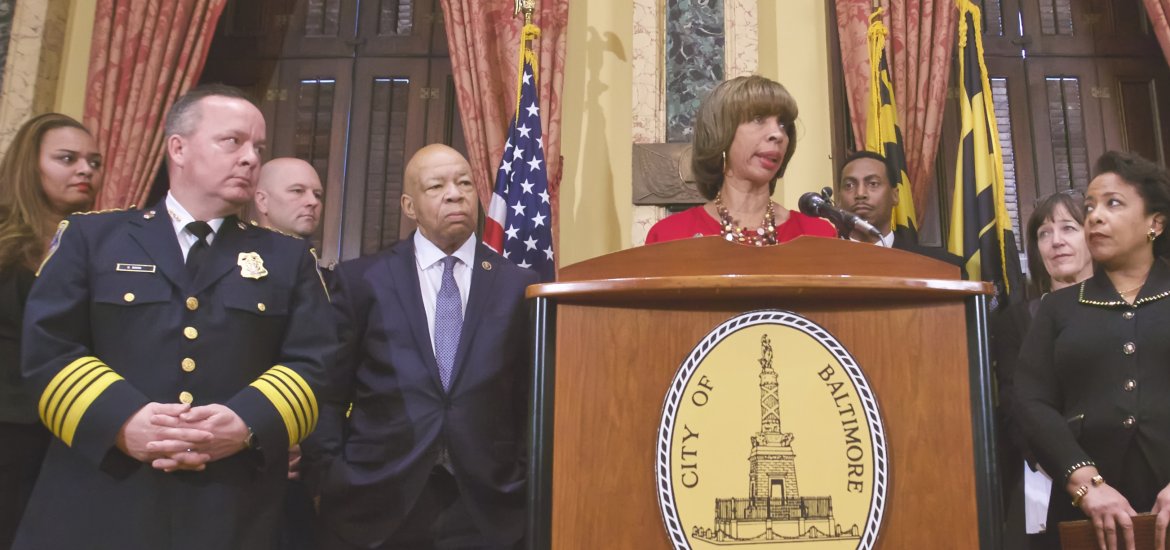On April 7, 2017, the City of Baltimore and the Department of Justice (DOJ) entered into a Consent Decree, which is a court enforceable agreement to resolve DOJ's findings that it believed the Baltimore City Police Department (BPD) had engaged in a pattern and practice of conduct that violates the First, Fourth, and Fourteenth Amendments to the United States Constitution, and certain provisions of federal statutory law.
Mayor Brandon M. Scott and the City of Baltimore will work together to reform the Baltimore Police Department and build the bond of trust that must exist between the community and the City's police officers. The goal of the consent decree is to have a stronger police department that fights crime while it serves and protects the civil and constitutional rights of Baltimore City residents.
The decree’s requirements focus on building community trust, creating a culture of community and problem-oriented policing, prohibiting unlawful stops and arrests, preventing discriminatory policing and excessive force, ensuring public and officer safety, enhancing officer accountability and making needed technological upgrades. Under the agreement, the parties will jointly recommend an independent monitor to the court to assess whether the requirements of the agreement are being implemented. The independent monitor will report publicly on BPD’s implementation efforts on a regular basis. As part of the process, the parties requested that the court provide an opportunity for members of the public and stakeholders throughout Baltimore to provide written submissions to the court about the proposed decree. The public hearing on the fairness of the proposed consent decree was held on April 6, 2017, wherein dozens of members of the community provided feedback and support for the consent decree. The Court then entered the Consent Decree the next day, on April 7, 2017.
Under the consent decree the City of Baltimore and the Baltimore Police Department will work with communities to implement comprehensive reforms that will ensure:
- Baltimore establishes a Community Oversight Task Force to recommend reforms to the current system of civilian oversight.
- BPD adopts a policing approach that is community-oriented and based on problem solving principles.
- Officers’ voluntary interactions are professional and courteous, and officers conduct all investigatory stops, searches and arrests in a manner that protects people’s rights.
- BPD provides equal protection of the law for all individuals, including providing impartial policing services.
- Officers use appropriate de-escalation techniques and attempt to resolve incidents without force when possible; use force in a manner that is proportional to the threat presented; and BPD’s use of force policies, training and review systems provide sufficient guidance, skills and accountability.
- BPD transports detainees in a manner that keeps them safe.
- Officers respect the First Amendment rights of all persons.
- BPD investigates sexual assault thoroughly and without gender bias.
- Baltimore conducts an assessment to minimize youth involvement with the juvenile and criminal justice systems, as appropriate, and that officers approach interactions with youth in a manner appropriate to their age.
- Baltimore conducts an analysis of gaps in the city’s mental health system in consultation with a committee of behavioral health experts and service providers, and BPD instructs and dispatches officers who are properly trained in interacting with people in crisis or with behavioral health disabilities when a police response is appropriate.
- Allegations of employee misconduct are fully, fairly and efficiently investigated; that all investigative findings are supported by the appropriate standard of proof and documented in writing; and that all officers who commit misconduct are held accountable pursuant to a disciplinary system that is fair, consistent and provides due process.
- Officers receive necessary equipment, policy guidance, training and support to do their jobs safely and effectively, and BPD performs a staffing study to ensure a sufficient number of officers and supervisors.

